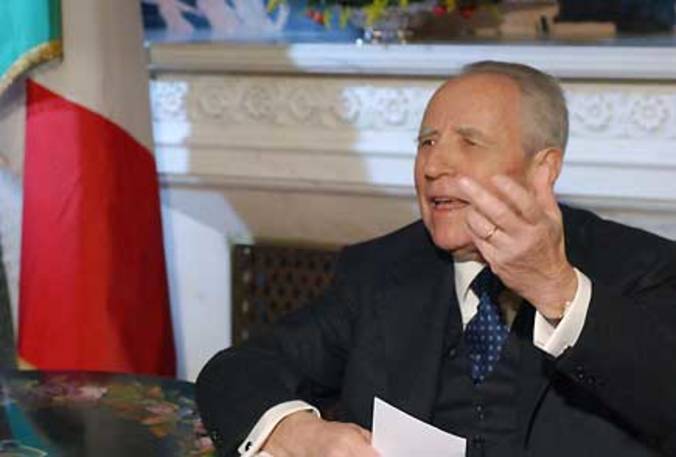


Italy today mourns the death at age 95 of former President Carlo Azeglio Ciampi, who was born in Livorno in 1920 and died on the morning of Sept. 16 in a Roman hospital following an operation in August. With the the Bank of Italy for 33 years, Ciampi was a technocrat who, however, served as a cabinet minister in several governments and was also the first Italian premier in a century not to have come to power from the benches of Parliament. In 1999 a two-thirds majority elected him on the first ballot to become the tenth president of Italy, an office he served through 2006.
Throughout his lifetime Ciampi was praised for his professionalism as a top economist and for his commitment to creation of the European Union. Called to be premier for 13 months in 1993 because he was a banker and independent of the politicians, he shepherded the country through the shock waves of the Tangentopoli kickback scandals. The fallout from what was also known as "Operation Clean Hands" had weakened the lira, disgraced a number of politicians and cast into doubt Italy's adhesion to the EU. Later, as Treasury Minister under Romano Prodi, Ciampi contributed to Italy's participation in the Maastricht Treaty. In 1996, according to the Reuters news agency, in one year Ciampi slashed Italy's fiscal defict from 6.7% to 2.7%, thus securing Italy's entry into the "currency club." His talented team of economists at the Treasury were called the "Ciampi boys" and included Mario Draghi, today president of the European Central Bank.
Ciampi's touching tributes to the Italy he loved are often quoted. In December of 2004 he addressed Italian youth, saying, "I know how much you love the environment, how much you work to protect it. That you try to live in harmony with the rhythms of nature. This is right. One feels stronger if one can give the best of oneself. Also try sometimes to rise at dawn, so as to live the daily miracle of the awakening of nature."
Not all the Italian presidents actually resided within the Quirinal Palace, but, for Ciampi as he neared the end of his presidency, "I had been called to represent Italy, to be the guarantor of the Constitution. This was not only a great mandate, but above all a duty and a mission. For this reason I have lived in the Quirinal Palace. For seven years this has been my home, the home of the President of the Republic, and the home of the Italians."
For former President Giorgio Napolitano, "Carlo Azeglio Ciampi was an extraordinary figure of an Italian and a European," who brought Italy prestige and respect. "He gave renewed vitality to the concept and to the symbols of our country, and personified important values: probity, moral integrity, hard work, talent. He had a rich cultural background, plus a dedication to the most noble causes." In 2005 it was Napolitano who had nominated Ciampi a life-time member of the Senate; only a few months later Napolitano himself would succeed Ciampi as president of Italy.
"He was the president of our rediscovered pride," says a headline in tomorrow's Corriere della Sera. Indeed, Ciampi was cut of a different cloth from the politicians. A graduate of the Scuola Normale Superiore at Pisa he specialized in ancient Greek literature and philosophy. After 1941 he fought in the Italian army including in Albania. But on Sept. 8, 1943, he rejected Mussolini's newly created Italian Social Republic, to join fellow partisan fighters in the Italian Resistance with the Partito d'Azione in the Abruzzi mountains and then in Bari. At war's end he entered the Italian central bank, rising through the ranks to become its governor from 1979 through 1993.
In 2010 his book, Non è il paese che sognavo (This is not the country of my dreams) was published by Il Saggiatore, written to honor Italy's 150th birthday. In speaking of his book, said Ciampi, "I believe in the dignity of people and in the ethics of the institutions.... This is a history of united Italy which belongs to us and which we are determined to defend with the only weapons we are willing to take into our hands: culture, memory, traditions." (To see a video of Ciampi speaking of his book, go to >>> [2])
He is aurvived by his wife, Franca Pilla, whom he met when both were just 18 years old and married in 1946, when they were 26. As First Lady, she charmed most Italians but could sometimes irritate a certain level of citizens as when, for instance, she attacked some state TV broadcasts because "they make people vulgar and bastardized." She also irritated a few Northern Italians when, during a visit to Naples, she declared that the Neapolitans and the Southerners in general "are better and more intelligent" -- and this despite the fact that she herself was a Northerner, born in Reggio Emilia.
Source URL: http://test.iitaly.org/magazine/focus/facts-stories/article/distinguished-former-president-carlo-azeglio-ciampi-dies-95
Links
[1] http://test.iitaly.org/files/distinguishedformerpresidentcarloazegliociampidiesjpg
[2] http://video.repubblica.it/politica/ciampi-presenta-il-suo-libro--non-e-il-paese-che-sognavo 2010/172560/171110?video